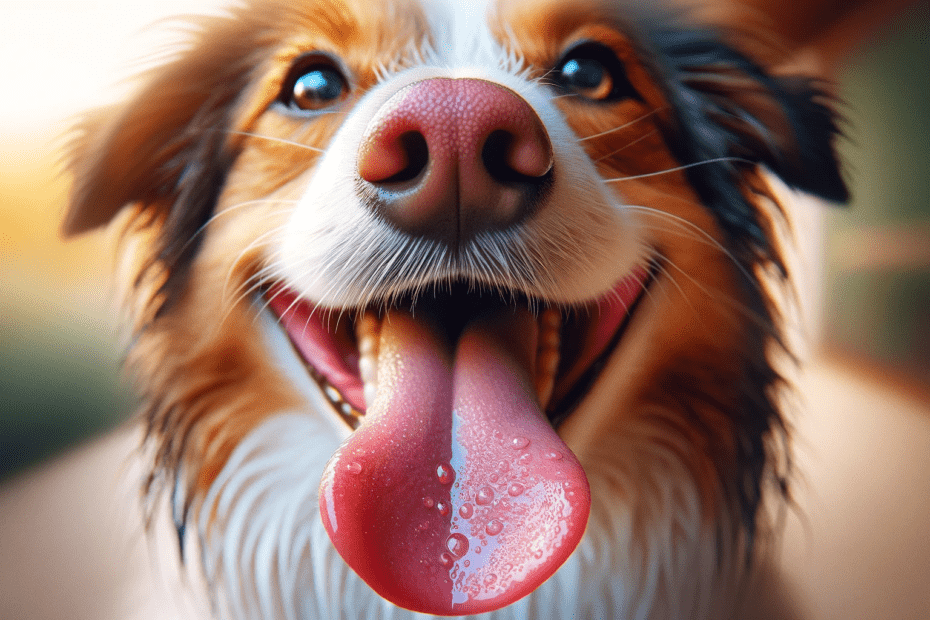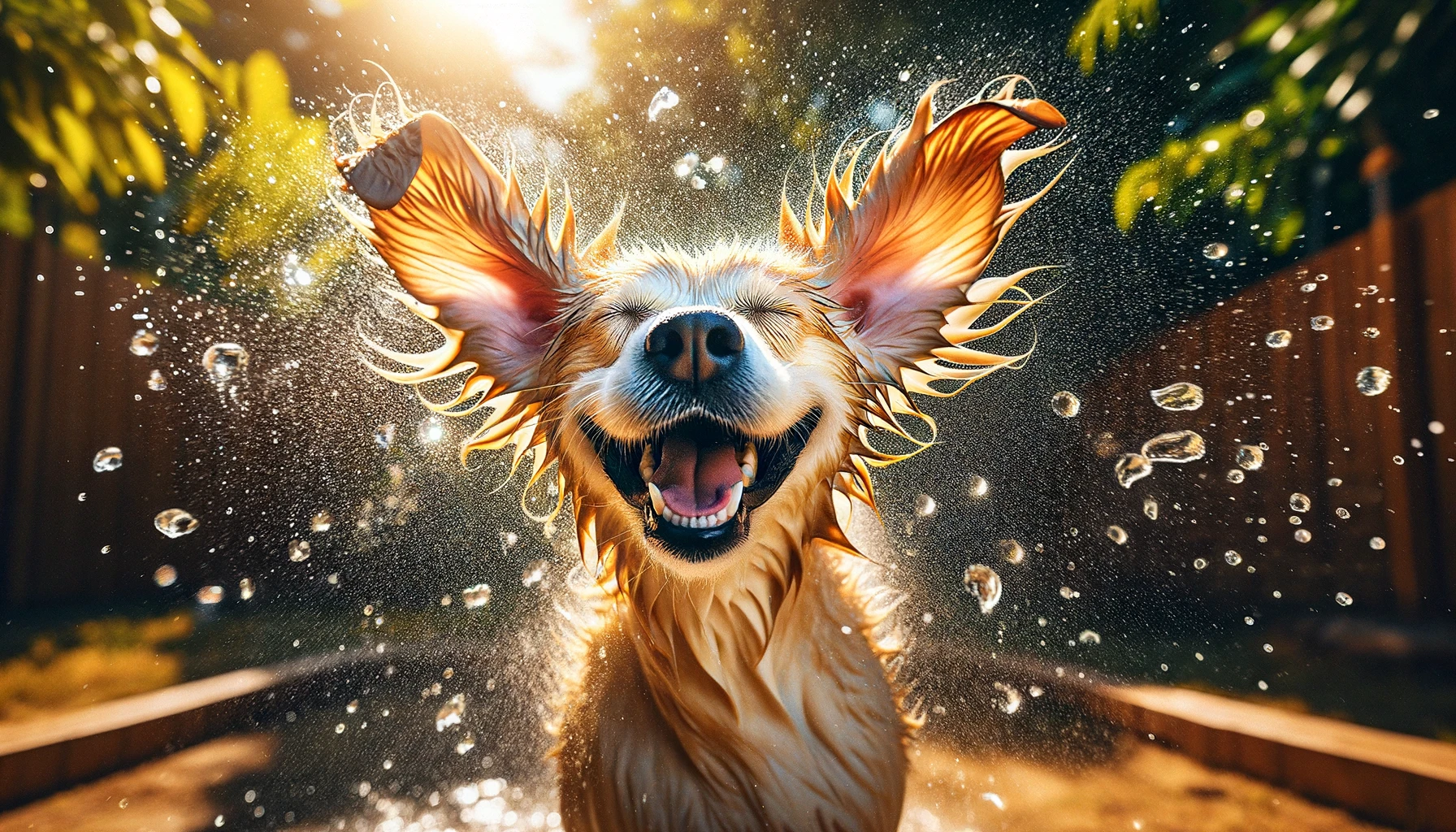In the realm of canine behavior, the act of a dog licking its owner’s nose has puzzled pet owners for ages. This article aims to shed light on the reasons behind this peculiar behavior, drawing upon scientific research and expert insights.
By exploring the various motivations behind this action, we hope to provide a comprehensive understanding of why dogs engage in this seemingly unconventional display of affection.
Join us as we delve into the fascinating world of canine communication and bonding.
Key Takeaways
- Licking the owner’s nose is a sign of affection and bonding.
- Dogs lick their owner’s nose to seek attention and connection.
- Licking is a natural behavior and form of communication for dogs.
- Dogs lick their owner’s nose to fulfill their need for affection and to explore their environment.
Sign of Affection
One common explanation for why dogs lick their owner’s noses is that it is a sign of affection. Dogs have a unique way of bonding with their human companions, and one of the ways they do this is through touch. Licking is a form of non-verbal communication that can convey a range of emotions, including love and affection.
When a dog licks their owner’s nose, it can be seen as a display of trust and intimacy. Dogs have a heightened sense of smell, and the area around the nose contains a wealth of information about their owners. By licking their owner’s nose, dogs are essentially gathering information and familiarizing themselves with their scent. This behavior is not only a sign of affection but also a way for dogs to strengthen the bond they have with their owners.
Furthermore, licking releases endorphins in dogs, which creates a pleasurable sensation for them. This positive reinforcement encourages dogs to continue the behavior and reinforces the bond between them and their owners.
It is important to note that while licking can be a sign of affection, it is essential to set boundaries and establish appropriate behavior with your dog to ensure a healthy and balanced relationship.
Seeking Attention
When a dog licks your nose, it is often a display of seeking attention. Licking is a bonding behavior that dogs use to communicate and connect with their human companions.
Dogs have a natural need for affection and attention, and licking is one way they express this desire. By initiating this behavior, a dog is indicating that they want interaction and engagement from their owner.
Licking as Bonding Behavior
Licking serves as a manifestation of dogs’ affectionate nature and their desire for connection with their human companions. Dogs use licking as a way to bond and seek attention from their owners. It is a behavior that can be observed in various contexts, such as licking their owner’s face or hands.
Dogs may lick as a form of stress relief, similar to how humans engage in activities like nail-biting or hair-twirling. This behavior helps them release tension and feel more relaxed.
Additionally, some dogs may lick to show dominance. By licking their owners, they are asserting their position as the leader in the relationship. However, it is essential to note that licking primarily serves as a bonding behavior and should be interpreted within the specific context of each individual dog and their relationship with their owner.
Dog’s Need for Affection
Dogs lick their owner’s nose as a way to seek attention and satisfy their need for affection. This behavior is a part of their love language, a way for them to communicate their desire for connection and closeness.
Dogs are social animals that have evolved alongside humans, and they have developed a strong bond with their human companions. Affectionate gestures like licking serve as a means for dogs to express their love and to seek reassurance and attention from their owners.
Providing affection to dogs has been shown to have numerous benefits, including strengthening the bond between the dog and owner, reducing stress and anxiety, and promoting overall well-being.
Understanding and responding to a dog’s need for affection is an important part of maintaining a healthy and happy relationship with our furry friends.
Communication and Bonding
One essential aspect of the relationship between humans and dogs is the role of communication and bonding. Dogs have a unique way of communicating with their human counterparts, which is crucial for establishing a strong connection. Communication in dogs is primarily non-verbal, relying on body language, vocalizations, and various other behaviors.
When a dog licks their owner’s nose, it is often seen as a form of communication and bonding. Licking is a natural behavior in dogs, and it serves multiple purposes. It can be a way for dogs to show affection, seek attention, or express submission. Additionally, licking releases endorphins in dogs, which helps them feel calm and content.
From a scientific perspective, licking the owner’s nose can also be attributed to a dog’s social instincts. Dogs are pack animals, and in a pack, members often engage in grooming behaviors as a way to strengthen social bonds. By licking their owner’s nose, dogs are mimicking this behavior and reinforcing their bond with their human companion.
Taste for Saltiness
Dogs have a taste for saltiness, which may explain why they lick our noses. Salt is an essential mineral that dogs need in their diet, and licking our noses could be a way for them to seek out this taste.
Additionally, licking is a form of sensory exploration for dogs, and our noses may have a unique scent or taste that piques their curiosity.
Salt-Seeking Behavior Explained
Licking the nose is a behavior in dogs that can be attributed to their innate taste for saltiness. This behavior is rooted in the anatomy of the dog’s tongue. The tongue of a dog contains taste buds that are sensitive to different tastes, including salt. Dogs have a natural preference for salty flavors, which is why they may lick surfaces that have traces of salt, such as human skin.
This salt-seeking behavior in dogs can also have health benefits. Salt is an essential mineral that plays a vital role in the body’s functions, including maintaining proper nerve and muscle function, regulating fluid balance, and supporting healthy heart function. By seeking out salt, dogs may be instinctively trying to fulfill their nutritional needs.
However, it is important to note that excessive salt intake can be harmful to dogs, leading to health issues such as dehydration and electrolyte imbalances. Therefore, it is crucial to provide dogs with a balanced diet that meets their nutritional requirements and consult a veterinarian for guidance on their specific dietary needs.
Licking as Sensory Exploration
Continuing the exploration of canine behavior, the act of licking surfaces, such as the nose, serves as a sensory exploration driven by dogs’ inherent preference for saltiness. Dogs have taste preferences that differ from humans, and their taste buds are sensitive to certain flavors. The saltiness of human skin, particularly on the nose, can be intriguing to dogs, leading them to lick and explore the area.
This behavior is not only driven by taste preferences but also by behavioral cues. Licking is a way for dogs to gather information about their surroundings, including other animals and humans. By licking the nose, dogs can gather scent molecules and taste the saltiness, helping them understand and navigate their environment.
This sensory exploration through licking is a natural behavior for dogs, and understanding their preferences and cues can help us better understand their needs and behaviors.
Mimicking Maternal Behavior
Frequently observed in canines, the behavior of licking their owner’s nose is often attributed to their innate ability to mimic maternal behaviors. Dogs, being social animals, have strong maternal instincts. When puppies are born, their mother licks them to clean them and stimulate their bodily functions. This licking behavior also serves as a form of communication and bonding between the mother and her offspring.
In the wild, adult dogs may engage in nose licking as a way to care for and groom their puppies. By licking their puppies’ faces, the mother dog not only helps to keep them clean but also establishes a sense of security and comfort. This behavior is thought to be imprinted in a dog’s DNA, allowing them to exhibit similar behaviors towards their human owners.
When a dog licks their owner’s nose, it can be seen as an expression of love, trust, and bonding. By mimicking maternal behaviors, dogs may be attempting to form a stronger connection with their human companions. This behavior is often seen in dogs that have a close and affectionate relationship with their owners.
It’s important to note that not all dogs exhibit this behavior, as every dog has its own unique personality and preferences. Additionally, excessive licking can sometimes be a sign of anxiety or stress, so it’s important to observe your dog’s overall behavior and consult with a veterinarian if you have any concerns.
Exploring Their Surroundings
Dogs engage in the behavior of nose licking as a means of sensory exploration. Canine curiosity drives them to investigate scents in their surroundings, and their noses play a vital role in this process. Dogs possess an incredibly keen sense of smell, with up to 300 million olfactory receptors compared to our mere 6 million. By licking their noses, dogs can enhance their sense of smell and gather more information about their environment.
When a dog licks its nose, it is gathering chemical signals from the air and surfaces. These signals contain valuable information about the presence of other animals, food sources, or potential threats. By actively licking their noses, dogs can collect these scent molecules and transfer them to their olfactory glands located on the roof of their mouth. This allows them to analyze the scents in more detail and gain a better understanding of their surroundings.
Furthermore, nose licking can also serve as a means of self-soothing or self-calming for dogs. It can help alleviate stress or anxiety in certain situations, as the repetitive motion of licking can have a soothing effect on their nervous system.
Display of Submission
After engaging in nose licking as a means of sensory exploration, dogs may display their submission to humans through various behaviors. Displaying submission is a natural behavior in dogs and is often seen as a way for them to communicate their deference to their human companions. Submission behavior can manifest in several ways, including lowering their body posture, exposing their belly, and avoiding direct eye contact.
One common display of submission is when dogs roll onto their backs and expose their belly. This behavior is a clear signal that they are not a threat and are willing to submit to the authority of their human. Additionally, dogs may also lower their head and tuck their tail between their legs as a sign of submission.
Avoiding direct eye contact is another way in which dogs display submission. By averting their gaze, dogs are acknowledging the human’s dominance and showing respect. Maintaining eye contact is often seen as a challenge in the animal kingdom, so when a dog looks away, it is a clear sign of submission.
Instinctual Grooming Behavior
One way dogs demonstrate their grooming instincts is through licking their human companion’s nose. This behavior is rooted in their ancestral instincts and serves multiple purposes. Dogs have a natural instinct for grooming, which is often observed in maternal grooming behaviors. When a mother dog licks her puppies, she not only cleans them but also provides them with sensory stimulation. This licking action helps to stimulate blood flow and encourages the puppies’ development.
When dogs lick their human companion’s nose, it can be seen as a form of maternal grooming. Dogs are known to form strong bonds with their human family members, and licking their noses can be a way for them to show affection and care. Additionally, dogs have a heightened sense of smell, and the nose is a sensitive area that provides them with a lot of information about their environment. By licking their human’s nose, dogs may be trying to gather more sensory stimulation and learn more about their surroundings.
Frequently Asked Questions
Can Excessive Nose Licking From My Dog Be a Sign of a Medical Issue?
Excessive nose licking in dogs can indeed be a sign of a medical issue. There are several possible medical causes for this behavior, including allergies, skin infections, dental problems, and gastrointestinal issues.
Differentiating between normal nose licking behavior and excessive nose licking that requires medical attention can be done by observing the frequency, duration, and intensity of the licking, as well as any accompanying symptoms.
If your dog’s nose licking is persistent, excessive, or accompanied by other concerning signs, it is recommended to consult with a veterinarian for a thorough evaluation and appropriate treatment.
Why Does My Dog Specifically Choose to Lick My Nose Instead of Other Parts of My Body?
Dogs have a complex psychology that influences their behavior, including their preference for licking certain body parts. When it comes to licking noses, dogs may be drawn to the unique scent and taste that the human nose emits.
Additionally, dogs may perceive the nose as an area of vulnerability, and licking it could be a form of grooming or showing affection. Exploring the cultural significance of nose licking in dog-human interactions could shed further light on this behavior.
How Can I Discourage My Dog From Licking My Nose if I Find It Uncomfortable?
If you find your dog’s nose licking behavior uncomfortable, there are alternative ways to show affection without engaging in this specific behavior.
For instance, spending quality time with your dog through play sessions, providing them with toys or treats, and offering verbal praise can all be effective forms of bonding.
Additionally, redirecting your dog’s licking behavior towards appropriate objects or toys can help discourage them from licking your nose.
Consistency and positive reinforcement are key in modifying your dog’s behavior.
Are Certain Dog Breeds More Prone to Nose Licking Behavior Than Others?
Behavioral differences among dog breeds can lead to varying propensities for nose licking behavior. Some breeds, such as the Labrador Retriever and the Boxer, are known for their affectionate nature and may be more prone to engage in nose licking as a form of social interaction.
However, it is important to note that individual personality and training also play a significant role in this behavior.
Additionally, the cultural context between dogs and humans can influence the frequency and interpretation of nose licking behavior.
Can I Train My Dog to Only Lick My Nose on Command?
Training techniques and positive reinforcement can be used to teach dogs specific behaviors, including licking on command. By consistently rewarding the dog with treats, praise, or play whenever they lick your nose on command, you can create an association between the action and the desired behavior.
It is important to be patient and consistent during the training process, as it may take time for the dog to fully understand and execute the command.
Conclusion
In conclusion, dogs may lick their owner’s nose for various reasons. One reason is as a sign of affection, seeking attention, or to communicate and bond with their owner. Another reason may be a taste for saltiness or mimicking maternal behavior.
Additionally, dogs may lick their owner’s nose to explore their surroundings, display submission, or engage in instinctual grooming behavior.
Understanding the reasons behind this behavior can help strengthen the bond between dogs and their owners.






